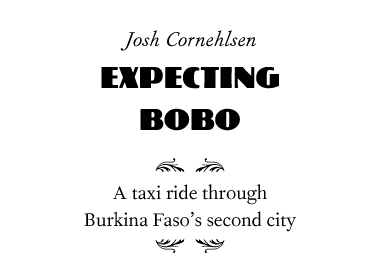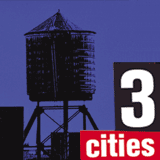 I am in a green taxi at the Place des Femmes, heading down the Boulevard de la Revolution past Hotel 421 and Disco One Love. The city of Bobo Dioulasso is relatively calm compared to Ouagadougou, Burkina Faso's capital five hours to the north. Bobo is probably calm compared to any nation's second city. But at sunset, the four-lane Boulevard is jammed with buses, cars and faces. Tonight, as usual, I opt to see them through the open window of a green cab and the weathered eyes of its driver. In Ouagadougou, green taxis are the unmetered taxis. Price negotiable. For a local, the price might be known or understood, a little more for each turn you have to make off the main road. For a tourist, the price gets discussed beforehand and is of course much higher. In Bobo, it's easier: all the cabs are green, and they are almost always the same price, 200 African francs or CFA (about $.25). Each shift, the drivers pay the taxi owners about 7,000 CFA, the equivalent of 35 passengers. Aside from the rare police crackdown, anything goes. They pick up whomever they want, and cram as many in as possible. Two minutes after getting into an empty backseat, you might have four very close new friends, a baby in your face, and its mother's oversized thigh on your lap – the driver still honking, looking for more business like we were a colony of dwarves. Tonight, my driver has a friend in the front seat not necessarily economical, but quite common. A travel companion, Salif changes the tapes, sings along, recruits most of the business from the passenger side window, and adds to the general ambience. He also pumps the gas. I can count on one hand the number of times I have been in a European or American taxi in Europe that has stopped for gas. Here it is strange if it doesn't. My friends and I had an ongoing tally to see who had the most consecutive trips with a pit stop. Within the first three months I myself was up to nine. By that time, we turned to each other and asked the obvious: Why, for the love of God, do they not fill the tank up in the morning? It is a question that I have never asked the taxi driver himself. I'm not sure I want to know, and besides, I'm still trying to beat nine. In any case, the time gets used up by juicier subjects and more pressing questions, and the drivers, I find, are people to whom almost anything can be asked. Nearly nothing is offensive, and the answer, if not completely factual, is almost always amusing. Upon arrival, I started right from the top. "What would you do, for example, if you were out at night and wanted to meet a girl?" "That's no problem. You just hiss and call her over." "And then what? What do you say?" "You ask her if she wants to pass the time with you. If she does she will sit down and you buy her a drink. If she doesn't she'll just laugh and walk away." I got the impression that maybe we were discussing different women. It was on another ride that I learned about the huge circuit that certain women follow: north to Mali, west to Senegal, down around the coast, and as far east as Gabon. Ghana seems to be a popular stop, so we watch what we say in English when we're out. "Pretty much any of the ones you see serving drinks are for hire," I'm told. "Two or three months and they're gone to the next spot." This, I realize, in a place where almost nobody travels, with the exception of the young men going to work the farms in the Ivory Coast. Eventually, my curiosity got the best of me and I asked how much. "Five hundred an hour." About seventy-five cents. Anything but to be a Burkina housewife, I suppose. On yet another ride, I tried politics, but found that to be a bit stickier. They will, for instance, list off complaints they have about the current government, poverty in general, and corruption, but nobody will say outright who they think killed the ex-president and popular revolutionary Thomas Sankara. You get the idea they have a pretty good guess. Colonization, on the other hand, is free game. "The countries that you colonized," the driver asked me, "are your people still there trying to control everything?" "We were a colony as well. It is a young country, so no", I said, knowing there were deeper answers to the same question. "Because the French, they try to control everything. They still run the army. And we call it a democracy, but it is really them who choose. When Ouattara won in the Ivory Coast, they rejected him as a foreigner, a Burkinabe, because he worked too closely with the Americans. They chose Gbagbo instead." Serious conversations like that aren't necessarily the norm. Most of the time the driver quizzes me on my paltry knowledge of local languages, asks me if I am French or German or British until he gets it right, and asks me when we are traveling back together. The joking is good fun and great for learning French, and the drivers are a source of knowledge on almost anything. If it is late though, dark and cool, the taxi is my release. I wait for one of the big, old, low-riding Mercedes, roll down as many windows as I can get to, and ride with my head nearly out one of them, soaking up every second and wishing it were longer. The day taxis, I figure, are for getting around, even seeing the city. But the night ones - the breeze on my half-closed eyelids, the rumble of the diesel engine in the soft seat, the reggae music in the tape deck - are for letting it sink in, appreciating it, and figuring out where exactly I'm supposed to end up, tonight and in general. In Bobo, there aren't all that many choices. Life here is quite simple, and surprisingly pleasant. The other day I found myself thinking I could really stay a while, a true ex-pat who's been sucked in by the mild, predictable weather, the contagious warmth of the people, and the feeling that what is happening here is happening because it needs to be. Of course, everything is new for travelers. But Bobo has felt quickly like home old ladies selling fresh fruit, the greetings in Jula (the most widely spoken local language), the cheap lunch spots, the sound of drums. I get the feeling that I could just stop wherever I am and sit down, talk to someone or just rest. When it is time to get up and go again, or if I have something I really need to know, I grab a green cab. I'd like to start picking further places to go, but Bobo just isn't that big.
Back to Top | More Extras | Subscribe to Topic
 |

